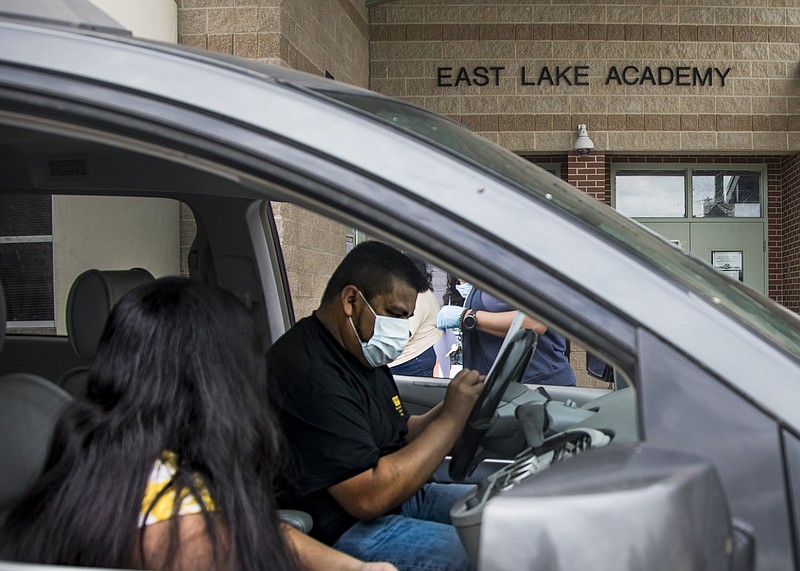One of Chattanooga's most vulnerable areas is being hit increasingly hard by the coronavirus, with new data showing 1 in 4 cases of COVID-19 in Chattanooga's 37407 ZIP code.
Wednesday also marked the largest single-day increase in cases in the county with 43. New cases have surged over the past three weeks, rising from 163 on May 1 to 447 on Wednesday. The health department attributed the increases to spread in workplaces that never shut down and among family members.
On Wednesday, the department also reported 26 cases of the virus in Chattanooga's chicken plants.
The ZIP code data released by the Hamilton County Health Department shows 107 of the county's 447 cases in that postal code, which accounts for 3% of the county's population.The health department previously made ZIP code data available only by releasing a range of case counts in each area, and it was estimated that 1 in 6 cases were in the ZIP code.
The 37407 area is more racially diverse than the rest of the county, with nearly 40% of residents being black or African American and more than 25% Hispanic, according to U.S. Census Bureau data. The zone, which includes East Lake and Clifton Hills, is home to many immigrant families, often living in close contact with one another for cultural reasons and because of the limitations of poverty.
The 37407 area has a poverty rate nearly four times higher than the county as a whole, with 45% of the population living below the federal poverty line, according to the census.
Lily Sanchez, communications coordinator for La Paz Chattanooga, said her organization has advocated for stronger efforts to reach the community since the pandemic began. La Paz partnered with the health department to put weekly radio advertisements on Radio Que Buena and share Spanish information online.
The working conditions of many community members in the 37407 area put them at increased risk of contracting the virus, Sanchez said.
"We also hope that the employers of these individuals, who are far and wide working essential jobs, will assess their preventative measures and ensure that they are keeping their employees safe," she said. "We have to address our shortcomings as a city when it comes to reaching this community."
The health department did not offer comment about the data released Wednesday but officials are scheduled to hold a news conference Thursday afternoon. Over the past week, the department repeated that focusing on ZIP codes is not necessarily the best approach.
"We feel focus on following the basic prevention practices (social distancing; wearing of masks when out in public or in places where distance [isn't possible]; not going to work when sick; and covering your cough) would be more helpful than focusing on specific ZIP codes," Tom Bodkin, spokesperson for the department, said in a May 14 statement.
The health department and community groups have stepped up efforts in recent weeks to bring testing to the city's most at-risk communities, including in public housing facilities.
On Wednesday, Cempa Community Care held its second pop-up testing event at the Avondale Youth and Family Development Center. The National Guard is expected to help with testing in several Chattanooga Housing Authority communities on Thursday and Friday. The health department launched a Spanish-language Facebook page that includes explanatory videos and testing information.
Hamilton County Commissioner Warren Mackey, who represents some of the ZIP codes hardest hit by the virus, said the socioeconomic realities of the area require increased resources to stop the spread.
"It behooves the Hamilton County Health Department to put double emphasis, special emphasis on addressing those populations," Mackey said.
Government alone, and the health department, cannot stop the virus. Nonprofits, civic organizations and the public need to help in the effort, he said.
A partnership between La Paz, Cempa, the health department, Clinica Medicos and LifeSpring Community Center will host COVID-19 testing on Friday between 10 a.m. and 3 p.m. at 1402 Bailey Ave.
Chattanooga saw its first COVID-19 case on March 13, when the pastor of St. Paul's Episcopal Church announced he contracted the virus.
For much of the pandemic, the region did not see the same patterns as elsewhere in the nation, where communities of color in some areas were disproportionally infected by the virus.
But in recent weeks, cases among Hispanic residents have grown to well over their representation in the Hamilton County population. As of Wednesday, Hispanics made up 46% of the coronavirus cases, compared to being 6% of the population.
The county has seen 13 deaths from the pandemic, a number that has remained unchanged since April 18.
Contact Wyatt Massey at wmassey@timesfreepress.com or 423-757-6249. Follow him on Twitter @news4mass.
